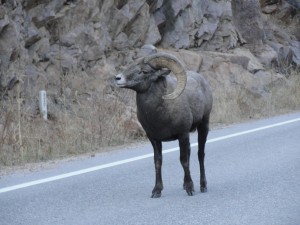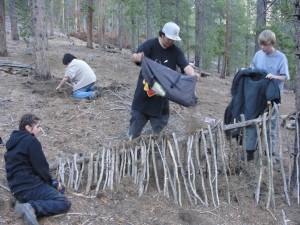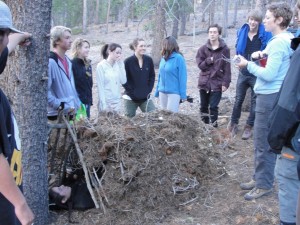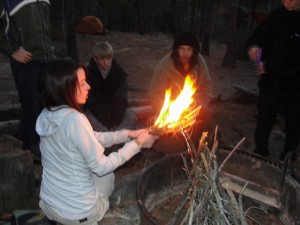From November 7-8, we headed out for the first weekend overnight. The campsite was Camp Cheley, near Allenspark, which offered a beautiful pine forest with a stream running by. The weather was mostly sunny, although the cool fall air warned us of winter, and the days felt shorter than ever. We still managed to fit in plenty of games and learn new skills.
We practiced some camping basics such as selecting campsites, setting up a bear hang, digging a sump hole, and preparing a fire. Also, we learned important wilderness survival strategies such as building shelter, fire-making techniques, and developing awareness in the outdoors. Some of these skills were put to the test in a fierce competition to see who could build the most effective survival shelter. While these shelters are not as easily constructed as they appear, they would make the difference between life and death in a survival situation. Things really got heated up when we learned about different methods of making fire. Everyone successfully made 1-match fires (sometimes using a couple extra matches) and cotton-ball fires.A few people were even able to use bow-drill kits to make fire by friction: a task that requires tremendous determination, perfect form, and sometimes a little luck. Well done!
We were lucky enough to have student-teacher / CAP veteran Aleyna Porecca along for her 7th CAP overnight to help everyone out with building fires, debris huts, and camp logistics. Michael Koehler, an intervention intern at New Vista, also came along for the ride. Right now Michael is studying wilderness therapy at Naropa, and he has been a tremendous asset on the last two CAP overnights. Thanks for the help you guys! These trips certainly would not be the same without you.
Most of the seniors in the group had just finished lengthy standardized testing and arrived late Saturday afternoon. Although they were weary, they soon forgot their stress and joined the festivities. The tone of the trip was lighthearted and full of laughter. New friendships were forged, stories were told, and the group transitioned into a community. All of these things were essential for tackling the environmental action project ahead.
The CAP overnights help to remind us what we are trying to protect, and why. CAP is a completely unique experience because students dictate their own education. They find an environmental issue they are passionate about, and then actively form resolutions to make the world into a better place. Often times, this task is daunting. It is an easy thing to shrug our shoulders and say that there is nothing we can do for the environment, but it takes hard work and courage to take a stand. The students of CAP are the future leaders of our community. The decisions they make will span beyond our lifetime and will affect the future generations. They are the Johnny Appleseeds of our time, planting hope for those that come after them.

The next trip will be December 7-8. Stay tuned!




Leave a Reply